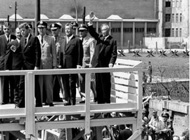|
|
|
 |
|
|
History
of German-American Relations > |
|
The politics of containment and strategies of deterrence that characterized the postwar period were called into question in the decades that followed. German and U.S. military-strategic, political, economic, and monetary interests were sometimes divergent, although never conflictive. In the 1950s and 1960s, many Germans felt that the partition of Germany was seen both in the West and in the East as an element of stability in Europe. It was believed that the non-confrontational response of the U.S. to the construction of the Berlin Wall in 1961 showed that the United States was not truly interested in German unification. John F. Kennedy's visit to Berlin highlighted his tour of several European countries in June 1963. In his speech from the Schoeneberger Rathaus on June 26, Kennedy declared his special commitment to West Berlin, concluding his remarks with these words: "All free men, wherever they may live, are citizens of Berlin, and, therefore, as a free man, I take pride in the words " Ich bin ein Berliner.'" Politics of detente in the 1970s both fulfilled some aspects of American and Russian security policy and Bonn's desires to develop more extensive opportunities for personal contacts between the Federal Republic and the German Democratic Republic. At the same time, beginning in the 1960s and continuing into the 1980s, a wide range of security issues revolved around the buildup of ballistic and nuclear missiles and the extent of the U.S. nuclear commitment to Western Europe. The Vietnam War, also strained relations. Some German students had the same concerns as many young Americans who also opposed the war. Anti-war demonstrations -- sometimes drawing 100,00 protesters -- made the headlines. Discussions of other aspects of American foreign and domestic policy, with special emphasis on the civil rights movement, also signaled the beginning of a more complex relationship. In the mid-1960s, West Germany was in the midst of its "economic miracle." Chronic frictions arose over monetary policy in the 1960s, partly stemming from opposing views on what constituted responsible monetary policy. The D-Mark became the "counterpart currency" of the dollar. The currencies rarely rose or fell together -- a strong dollar matched a weak German Mark, and vice versa. Issues relating to trade only became problematic in the last 1980s when disputes arose between the European Community and the United States during the Uruguay Round of the General Agreement on Tariffs and Trade (GATT). See also: |
||
| Texts
are abridged from U.S. State Department IIP
publications and other U.S. government materials. |
||
| What
kind of information materials are available?
CD: These documents are available in fulltext format on the About the USA CD-ROM. Teachers: Request a copy for classroom use. L: Selected documents are available in German as well as other languages, including Arabic, Chinese, French, Spanish, Persian and Turkish. |
DISCLAIMER
Any reference obtained from this server to a specific commercial product, process, or service does not constitute or imply an endorsement by the United States Government of the product, process, or service, or its producer or provider. The views and opinions expressed in any referenced document do not necessarily state or reflect those of the United States Government. |

